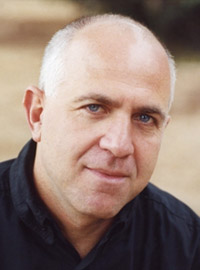The summer scene in Israel is so packed with diverse festivals that it almost seems to the visitor that the main concern of the people is to enjoy life.
The Tel Aviv Oud Festival takes place every year in August and this year marked its 11th anniversary. The oud, considered an ancestor of the guitar, is a pear-shaped stringed instrument commonly used in Middle Eastern, Balkan and North African music. The festival presents a wide variety of music, from Jewish folklore to classical Arabic music, Greek and Turkish music, authentic Israeli music and religious songs.

Eli Grunfeld (Copyright: Dina Guna) |
This festival's popularity and success is the result of the efforts of Eli Grunfeld, initiator and artistic director, who, having served as a combat medic during the 1982 war in Lebanon, vowed to build bridges of understanding through music if he came out of the war alive.
During the week-long Tel Aviv Oud Festival held last August, an evening was devoted to the songs of the famous Arabic singer Umm Kulthum, performed by the talented singer Lubna Salame, accompanied by the Arab Orchestra of Nazareth under the baton of Nizar Radwan. The Nazareth Orchestra specializes in performances of classical and traditional Arabic music. Lubna Salame is a resident singer with the Nazareth Orchestra. As a child, she began singing classical Arabic songs with a church choir. She specialized in singing the songs of Umm Kulthum, Layla Mourad and Yisman.
Umm Kulthum is very popular in Israel, among Jews and Arabs alike, and a street in Jerusalem was recently named after her. One of her best known songs, Enta Omri, was the basis of many reinterpretations, including a 2005 collaborative project of Israeli and Egyptian artists. Zehava Ben, an Israeli singer, has performed and recorded much of the music identified with Umm Kulthum. Moshe Habusha (also an oud player), born in Jerusalem to a Jewish family of Iraqi origin, has recorded sacred Hebrew texts set to the music of Umm Kulthum and other Egyptian artists.
Other noteworthy performances included Bosnian-born musician Marina Toshich on the oud in "Bosnian Blues", traditional Jewish liturgical music from Libya, and a dialogue based on traditional Arabic music performed by Taiseer Elias on oud and Hagai Bilitzky on bass. Taiseer Elias was born in the Israeli Arab village of Shefaram, and is regarded as the leading figure in classical Arab music in Israel. He holds an MA and PhD in ethnomusicology from the Hebrew University, Jerusalem and was the founder of the Orchestra of Classical Arab Music in Israel.
We don't have to wait until next summer for the next oud festival in Israel - the
2013 Jerusalem International Oud Festival, celebrating its 14th anniversary, takes place from October 31 to November 9, featuring Israeli, Greek, Turkish and Egyptian music. Songs by Umm Kulthum will be performed by the
Alfarabi Orchestra under the musical direction of conductor Sami Khsheibun.